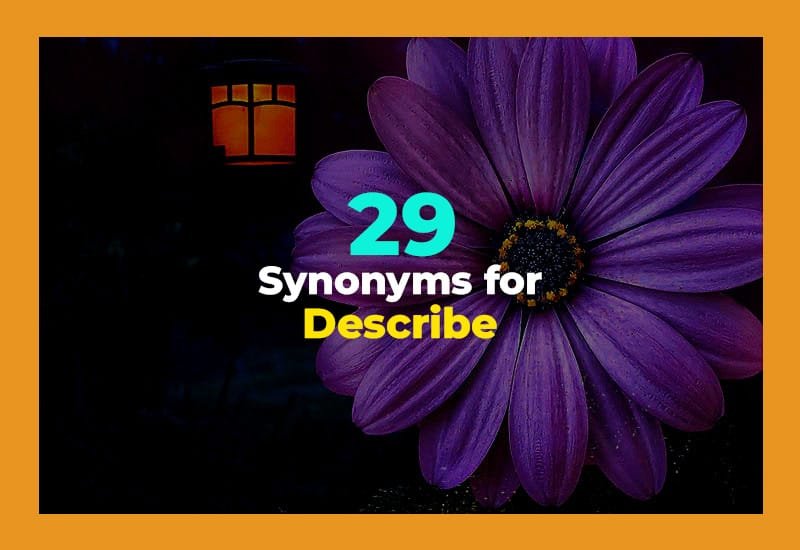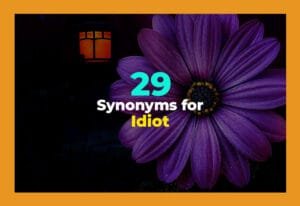When we talk about sharing something with others, often we use the word describe. But there are many other ways we can express the same idea, such as explain, portray, or narrate. Using different words can make speaking and writing more interesting. In this article, we will explore 29 useful synonyms for DESCRIBE with meanings and examples.
| Synonym | Meaning | Example |
|---|---|---|
| Explain | To make something clear by giving details | She explained how the machine works. |
| Portray | To show or represent something | The artist portrayed the hero as brave. |
| Depict | To show something through art or words | The painting depicts a calm beach. |
| Illustrate | To give examples to make an idea clear | The teacher illustrated the lesson with pictures. |
| Express | To show thoughts or feelings | He expressed his sadness through poetry. |
| Define | To give the exact meaning of something | The book defines success as progress. |
| Present | To show or share information | She presented her project to the class. |
| Convey | To communicate or make someone understand | His smile conveyed happiness. |
| Clarify | To make something easier to understand | She clarified the rules for everyone. |
| Narrate | To tell a story in detail | He narrated his travel adventures. |
| Relate | To tell a story or connection | She related her childhood memories. |
| Outline | To give the main points without full detail | He outlined the plan in short steps. |
| Characterize | To show qualities of a person or thing | The writer characterized the king as wise. |
| Detail | To give small pieces of information | She detailed the steps carefully. |
| Summarize | To give the main idea in short form | He summarized the book in a few lines. |
| Indicate | To show something or point it out | The sign indicated the right direction. |
| Recount | To tell about something that happened | He recounted the story of his youth. |
| Report | To give information about events | The news reported the accident. |
| Represent | To stand for or show something | The dove represents peace. |
| Sketch | To draw or give a brief outline | She sketched a quick drawing of the house. |
| Deposition | To give a formal statement | The witness gave a deposition in court. |
| Demonstrate | To show how something works | He demonstrated how to use the tool. |
| Elucidate | To explain in detail | The guide elucidated the rules. |
| Specify | To state something clearly | She specified the time of the meeting. |
| Interpret | To explain the meaning of something | The teacher interpreted the poem. |
| Exhibit | To show something publicly | The museum exhibited old paintings. |
| Render | To present or give an idea | The artist rendered the scene beautifully. |
| Denote | To show or mark something | The red sign denotes danger. |
| Announce | To make something known publicly | They announced the winner proudly. |
Explain
When you use the word explain, it means you are trying to help someone understand something better. You do this by giving more details, reasons, or examples. Explaining is very common in daily life. For example, a teacher explains a lesson, or a friend explains how to play a game. It is about making something easier for others to know.
- She explained the recipe step by step.
- He explained the rules before the game started.
- The guide explained the history of the old castle.
Portray
To portray means to show or represent something in a way that people can imagine or feel. Writers, artists, and speakers often use this word when they want to show the qualities of a person, place, or event. Portraying can be done with words, pictures, or even actions. It helps others see the subject in their mind.
- The movie portrayed the hero as kind and strong.
- The book portrayed the village as peaceful.
- The play portrayed friendship in a touching way.
Depict
The word depict means to show something, often in art or writing. It is very similar to portray, but it is often used when talking about paintings, drawings, or detailed writing. When you depict something, you make it possible for others to see it clearly in their imagination.
- The painting depicts children playing in the park.
- The story depicts life in a small town.
- The mural depicts a scene of celebration.
Illustrate
To illustrate means to give examples, pictures, or drawings to help others understand an idea. Teachers, books, and guides often illustrate because it makes learning easier. It can also mean drawing pictures that show something. Illustrating always helps people see or understand a point better.
- The teacher illustrated the lesson with funny stories.
- The book illustrated the steps with diagrams.
- She illustrated her speech with real-life examples.
Express
When you express something, you show your thoughts, ideas, or feelings. It can be done with words, actions, art, or even music. Expressing is very powerful because it allows others to understand what is inside your mind or heart. It is not only about telling, but also about showing emotions.
- He expressed his love with a gift.
- She expressed her excitement by jumping.
- The poem expressed sadness beautifully.
Define
To define means to give the exact meaning of a word, idea, or thing. Dictionaries define words so that people can understand what they mean. When you define something, you make its meaning very clear, so there is no confusion.
- The teacher defined the new word for the students.
- The speaker defined success in his own way.
- She defined honesty as always telling the truth.
Present
When you present something, you show or give information to others. This can be done in school, work, or even in everyday life. Presenting often means sharing something in a way that others can see, hear, or read. It is about putting an idea or object in front of others.
- She presented her research in class.
- He presented the award to the winner.
- The chef presented the food beautifully.
Convey
To convey means to communicate an idea, feeling, or message to someone. It is not only about words but also about body language, art, or even music. Conveying makes sure that what is in your mind reaches another person.
- His eyes conveyed deep sadness.
- The painting conveyed peace and calmness.
- She conveyed her gratitude with a smile.
Clarify
When you clarify something, you make it easier to understand. It means you explain or give more detail so that confusion is removed. Clarifying is very important when instructions or ideas are not clear enough.
- The teacher clarified the rules again.
- He clarified the meaning of the question.
- She clarified her point with more examples.
Narrate
To narrate means to tell a story or describe events in order. Narrating often happens in books, films, or even when friends share experiences. It can be detailed and often helps listeners or readers imagine the events.
- He narrated the story of his childhood.
- She narrated her travel journey.
- The actor narrated the movie with a deep voice.
Relate
When you relate something, you tell it to someone, often by sharing your own experiences. It can also mean showing a connection between two things. Relating makes the listener feel closer to the speaker because it often includes personal details.
- She related her happy school days.
- He related the event to his own life.
- They related the story to their friendship.
Outline
To outline means to give the main ideas or points without going into full detail. It is like giving a short plan or structure of something. Outlining is very useful when you want to share the most important parts quickly.
- He outlined the plan for the trip.
- She outlined the steps of the project.
- The teacher outlined the main ideas of the lesson.
Characterize
When you characterize something, you describe its qualities, features, or traits. This word is often used in stories, writing, or analysis. Characterizing helps people understand the special details that make a person or thing different.
- The writer characterized the hero as brave.
- She characterized the food as spicy and rich.
- He characterized the city as busy and noisy.
Detail
To detail means to give small pieces of information carefully. Detailing is useful when someone needs to understand something fully. This word shows that every part or step is explained.
- She detailed the process of baking a cake.
- The guide detailed the history of the castle.
- He detailed the plan for the event.
Summarize
When you summarize, you give the main idea of something in a shorter way. Summarizing is good when you want to share the most important points without all the extra details.
- He summarized the book in three lines.
- She summarized the meeting quickly.
- The teacher summarized the lesson at the end.
Indicate
To indicate means to show or point something out. It can be with words, signs, or even body movement. Indicating helps others notice or understand what is being talked about.
- The map indicated the nearest hospital.
- She indicated the chair with her hand.
- The sign indicated danger ahead.
Recount
When you recount something, you tell about an event or experience in detail. It often means telling a past story or memory. Recounting is very common in storytelling and daily conversations.
- He recounted his first day at work.
- She recounted her childhood adventures.
- They recounted the funny trip they had.
Report
To report means to give information about something that has happened. It is often used in news, schools, or offices. Reporting helps others know about events, facts, or updates.
- The news reported the storm.
- She reported the problem to the teacher.
- He reported the score of the match.
Represent
When you represent something, you stand for it or show it. Symbols, pictures, or even people can represent ideas or groups. Representing is about showing something in another form.
- The flag represents the country.
- The dove represents peace.
- He represented his team in the meeting.
Sketch
To sketch means to draw a quick picture or to give a short description. Sketching does not have full details, but it gives a general idea. It is often used in art or planning.
- She sketched a quick picture of the park.
- He sketched the idea for his design.
- The teacher sketched the plan on the board.
Deposition
A deposition is a formal statement or testimony, usually given in court or law. It means describing what happened in detail for legal records. Depositions are serious and official ways of describing.
- The witness gave a deposition in court.
- His deposition helped solve the case.
- She gave her deposition to the lawyer.
Demonstrate
To demonstrate means to show how something works or is done. It can also mean showing a feeling or action. Demonstrating is useful when someone wants to teach or prove something.
- He demonstrated how to use the computer.
- She demonstrated kindness by helping.
- The coach demonstrated the exercise.
Elucidate
The word elucidate means to explain something in detail so that it becomes easier to understand. It is often used when someone needs to clear up something complex.
- The guide elucidated the rules carefully.
- He elucidated the meaning of the text.
- She elucidated the problem for her friend.
Specify
To specify means to say something clearly and exactly. It is often used when giving instructions or orders. Specifying removes confusion because it tells the exact detail.
- She specified the time of the meeting.
- He specified which book to read.
- The teacher specified the rules for the test.
Interpret
When you interpret something, you explain what it means. It can be a word, a picture, or even body language. Interpreting is useful when meanings are not clear.
- She interpreted the dream for her friend.
- He interpreted the poem in class.
- The guide interpreted the old symbols.
Exhibit
To exhibit means to show something publicly. It can be art, objects, or even skills. Exhibiting allows people to see or know about something.
- The museum exhibited old coins.
- She exhibited her artwork at the show.
- He exhibited his talent in singing.
Render
The word render means to present, give, or show something in a form. It can be used for art, services, or even decisions. Rendering makes an idea or work visible to others.
- The artist rendered the scene with bright colors.
- The computer rendered the video quickly.
- He rendered help to the poor.
Denote
To denote means to show, mark, or be a sign of something. Words, signs, and objects can denote ideas or meanings. It is about pointing out what something stands for.
- The red light denotes danger.
- The smile denotes happiness.
- The symbol denotes power.
Announce
When you announce something, you make it known publicly. Announcing is about sharing information in a way that everyone can hear or know. It is often used in events, schools, or news.
- They announced the winner of the game.
- The teacher announced a holiday.
- The company announced the new product.

Final Thoughts
There are many different words we can use instead of describe. Each synonym has its own special use, and knowing them helps us speak and write in more interesting ways. Exploring these options gives us more freedom to share ideas, stories, and emotions. With practice, using these words becomes easy and helpful in everyday life.









